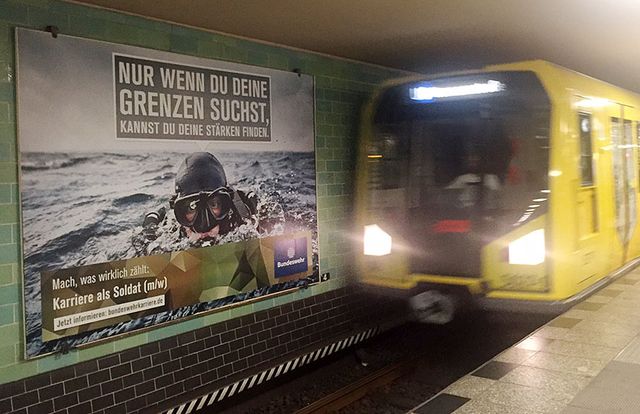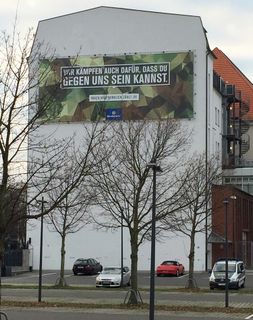Ludwig Weller
Just weeks before the Berlin state election, the German armed forces [Bundeswehr] has stepped up its odious campaign for new recruits. Large format posters have been plastered all over the city’s subway stations, bus stops and pedestrian zones. The aim of the campaign is to solve the recruitment problem of the Bundeswehr and win over young people for Germany’s current war drive.
 Propaganda poster in the Berlin metro
Propaganda poster in the Berlin metro
The campaign, which is being carried out in other German cities as well, seeks to appeal to young people with the motto: “Do something that really counts”. Through such provocative language the Bundeswehr declares itself to be “the most attractive employer in Germany” (Defense Minister Ursula von der Leyen), which will enable young people to fulfil themselves in the fight for noble goals and values.
Some of the slogans (daubed in army camouflage colours), used on a total of 5.5 million postcards, 30,000 posters, videos and ads on Facebook, Google and Instagram, include: “For us it is about getting ahead. Not just about staying still”, “You will only reveal your powers if you go to your limits”, “We are also fighting for your right to oppose us”, and quite bluntly: “Trouble spots will not be resolved by hanging around and drinking tea.”
 Propaganda poster on a wall in Berlin
Propaganda poster on a wall in Berlin
The real reasons for German soldiers intervening to “resolve trouble spots” was laid out clearly in the “White Paper 2016 on German Security Policy and the Future of the Bundeswehr”, published in July. Under the heading “Germany’s strategic priorities”, the document states that the German economy is “just as dependent upon both securing raw material supply and international transport routes as on functioning information and communication systems”. However, the Bundeswehr could only “carry out its tasks and commitments … when it has a body of soldiers oriented to its actual demands.”
The document makes clear that the aim of the German army has nothing to do with enabling young people to “fulfil themselves” or fighting for democratic rights. As was the case in the First and Second World Wars, and more recent conflicts supported by the German ruling elite in Yugoslavia, Afghanistan and the Middle East, thousands of young people are to be used as cannon fodder on behalf of the geostrategic and economic interests of German imperialism.
Ironically, the city of Berlin, where it is impossible to take a step without being reminded of the terrible crimes of German militarism in World War II, is once again to be the central recruiting centre. In the middle of the city, at Friedrichstrasse Station, the Bundeswehr opened a so-called showroom in 2014. Directly opposite is a memorial recalling the Nazi transport of Jewish children to death camps.
 Recruitment office of the Bundeswehr at Berlin Friedrichstraße
Recruitment office of the Bundeswehr at Berlin Friedrichstraße
The current Bundeswehr missions are extremely unpopular precisely due to Germany’s history, and the army therefore has had enormous recruitment problems since the suspension of conscription in 2011. In July, Defence Minister von der Leyen stated she was “dissatisfied” with the high drop-out rate “of around a quarter [of all recruits] in voluntary military service.”
In its desperation the government has even turned to the recruitment of juveniles. In 2013, over 1,000 17-year-olds were trained to fire weapons. Following pressure from child rights activists, a UN committee criticised the “various advertising campaigns of the Bundeswehr, which are specifically aimed at children, as well as … the presence of German troops in the schools”, and called for a ban of such practices.
Following the call two and a half years ago by President Joachim Gauck, and Germany’s government officialdom as a whole, for a revival of militarism, “career counsellors” and “youth officers” of the Bundeswehr have stepped up their attempts to recruit in schools and job centres. The total cost of the advertising campaign is estimated to be €30 million ($US 33.5 million) with 140 “counselling centres” operating nationwide.
In addition, events have been organised for the unemployed at job centres and for students in vocational information centres (BIZ) and schools. Celebrations such as “Army Day” are intended to once again position the military “in the middle of society” (White Paper 2016). Air Force officers who have just returned from their missions in Afghanistan or Syria now instruct 12-year-old children in the use of military equipment.
Currently, the reintroduction of conscription is being tested out, and information channels are being secured for recruitment or the general mobilisation of necessary personnel. In an “emergency” the Federal Employment Agency can compel men and women to work in “key social and defence areas”. These measures were incorporated in the “Concept for Civil Defence” (KZV), officially presented by Interior Minister Thomas de Maizière last Wednesday in Berlin.
In this situation the election campaign of the Socialist Equality Party (PSG) assumes increasing importance. While the army and government prepare the population for war, the PSG fights for the building of an international movement against war and capitalism. One of its election posters reads “No more war: billions for schools and jobs instead of armaments and war”. Another reads: “The German elites once again want more war––We say no.”
No comments:
Post a Comment